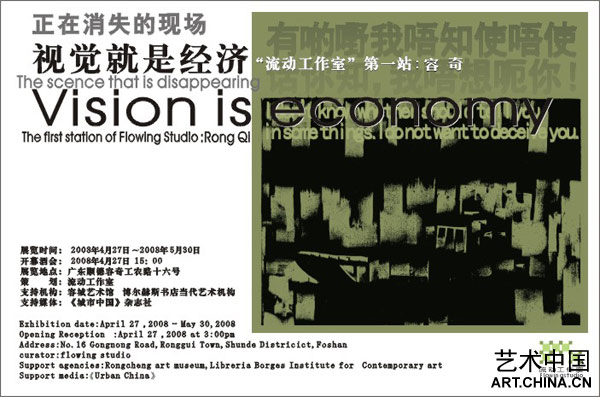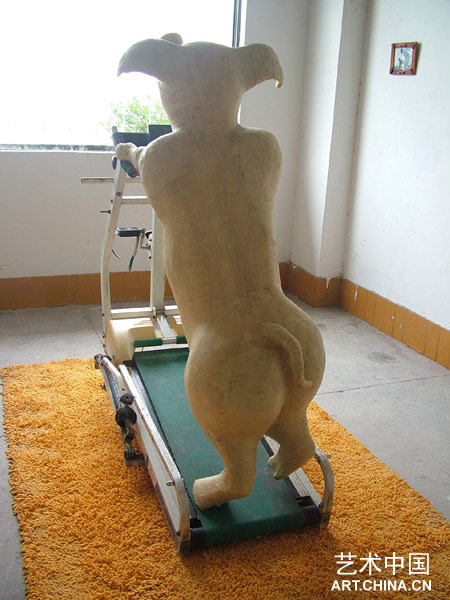
正在消失的现场
“流动的工作室”的第一站:容奇
项目
“正在消失的现场”是流动工作室自发策划的一个长期持续的展览活动项目,所谓“流动”就是工作室的空间将会不定期地转移,它的所在地就是那些失效的或过期,将会被拆掉的建筑空间,所以,展览活动的地点会不断变化。
活动的目的是通过这样流动的过程来考查一些非中心地区的、微观的经济文化生态,挖掘一些隐秘的民间野史个案,为活动提供更多社会学和地质学意义上的素材。以当代艺术实践发生的“空间转换”来改变艺术实践的方式作为一个重要的前提,也涉及与之前固有的当代艺术实践方式和展示空间的应对。相信存在这样的可能:空间的转换会带来角度的更新和状态的提升,同时能通过在这些空间里的一系列艺术实践活动及特殊的方式来介入或投射社会现实的某些问题,用活动本身来对应现实的问题情境,这是一个主要的出发点。同时,我们也希望通过这样的活动将当代艺术的能量延伸到基层的地带,让当代艺术与更多的非中心地带发生关系。
我们将对空间进行具体的分析、了解和评估,在实践成本上进行仔细的考量和规划。然后确定活动的详细计划,邀请不同领域的艺术家、学者和文化工作者参与,在某一空间展览活动次数不定。现场展示内容包括:录像、装置、文献、摄影、绘画、纪录片。
The scence that is disappearing .
The First Station of “Flowing Studio”: Rongqi
project
“The site that is disappearing or changing” is a long-term continuous project of exhibition activities planned spontaneously by Flowing Studio. The so-called “Flowing” means that the space of the Studio will transfer irregularly, with the location being the expired or aging architectural space to be demolished, so the place of exhibition activities will continue to change.
The purpose of such activities is to investigate the microeconomic and cultural ecology in some non-central regions, to explore some secret individual cases about unofficial folk history, and thus provide more sociological and geological source materials for the activities. Using “space conversion” of contemporary art practice to change the art practice way is considered as an important precondition, it also involves the response to the intrinsic contemporary art practice way and exhibition space. We believe in the following possibility: the space conversion will result in the renewal of visual angle and upgrade of status, and meanwhile a series of art practice activities in these spaces and the special practice ways can be used to intervene or reflect some realistic problems in the society. Using the activities to reflect the realistic problems is a major starting point. Meanwhile, we also hope that such activities can spread the energy of contemporary arts into grass-roots areas, and make the contemporary arts associated with more non-central regions.
We’ll analyze, understand and evaluate the space in details, consider and plan carefully about the practice cost, then determine on specific plans for activities, and invite artists, scholars and cultural workers to participate in the activities. The number of exhibition activities within certain space is indefinite. The on-site exhibition includes: videos, devices, literatures, photographs, paintings and documentary films.
空间
容奇工作室所在地的背景资料:
容奇工作室位于顺德容奇工农路十六号,原为容奇米厂。周围顺德德胜河大堤外约200米的范围内,有大大小小数十家老厂房。这些厂房大都建于上世纪50年代的“大跃进”时期,其中包括著名的顺德缫丝机械配件厂、桂洲石灰厂、容奇米厂、顺德冰厂等,形成早期顺德的老工业区。有些厂房甚至是解放前所建,多在2000年前后或倒闭或转产。由于位处省一级水源保护区,政府已下发搬迁令,这些曾经代表着顺德工业辉煌时期的老厂房再近年内都将被拆除。
Background Information about Site of Rongqi Studio:
Located at No.16 Gongnong Road, Rongqi, Shunde, Rongqi Studio was once Rongqi Rice Mill formerly. There are dozens of old workshops in the range of approximately 200 meters surrounding Shunde Desheng River Dam. These workshops were mostly built in the period of “Great Leap Forward” in 1950’s, including Shunde Filature Machine Component Plant, Guizhou Lime Plant, Rongqi Rice Mill and Shunde Ice Mill, which constituted the old industrial area of Shunde in early days. Some of those workshops were even built before liberation and mostly either wound up or changed the line of production around 2000. Due to the location in the provincial-level water source reservation, the government has issued the order of move and these old workshops that once represented the splendid era of Shunde industry will be demolished in recent years.
艺术活动
“流动工作室”容奇站活动之一:“视觉就是经济” 艺术活动
“视觉就是经济”应是一个具有审视性质的判断。
“视觉”在这里不单单是生理的功能,更重要的是“视觉”如何变成一个社会生活系统中重要中介者——它成为思考的一个主要素材来源,对大部分人来说,这就是他们日常生活的重要构成部分。不断制造出来视觉传播载体及资讯扩充个体的认知界面,同时也造成了不同程度的认知干扰。
“视觉”在社会的政治经济活动中充当了不可缺少的作用,“视觉”要变成成品就必然需要成本,它被设计,被制作,出版,变成视觉成品,形成大批量极具侵略性和诱惑性的符号,通过传播系统将图像、影像、物品迅速散发、辐射,影响力和繁殖力惊人。这是一个视觉符号过剩的时代,一切社会经济生产运作的关系都这些表面的符号所暗示和引证。
城市有城市的视觉系统,乡镇有乡镇的视觉系统,农村有农村的视觉系统,这是一种政治经济活跃程度的等级化体现。当然这是一个很正常的视觉分配。
作为视觉成品的艺术品是特殊的终端产品。它的产生来源于艺术生产者的精神成本及资金成本,艺术生产者通过复杂的心智、体验、灵感的融合与投入,同时也将社会的文化现实作为某种内在的参照,在一个整体考量的基础上,作品的生产就有了充分的条件。
实际上,大部分艺术品的生产会对应一种特定的社会政治经济的语境,它们对特定的现实状态作出反应也从这种特定状态中产生。
Exhibition and activities
The first activity at “Flowing Studio” Rongqi Station: “Vision is economy”
“Vision is economy” should be a judgment of perspective nature.
“Vision” does not merely refer to physiological function, but more importantly how to change “vision” into an important medium in social life system, which has become a major source material for thinking. For most people, this is an important component for their daily life, i.e. to create continuously the cognition interface of visual communication carriers and information extension units, but meanwhile it results in cognitive disturbance of different levels.
“Vision” plays an indispensable role in social political and economic activities. To change “vision” into finished products naturally needs cost. Once designed, manufactured and published, it changes into finished visual products, and forms into a large number of aggressive and seductive visual symbols. Images and pictures, videos and articles are distributed and spread rapidly via the transmission system, with an amazing influence and reproduction potential. This is an era of superfluous visual symbols, since all the social economic production and operation relations are implied and adduced by these superficial symbols.
Cities have their own visual system, and towns and rural areas have their own systems too. This is a kind of hierarchical embodiment of political and economic dynamic levels. Naturally, this is also a normal visual distribution.
The artworks as the finished visual products are special terminal products. Its origin comes from the psychic cost and financing cost of the artists, who integrate and utilize their complicated thinking, experience and inspirations, and meanwhile consider comprehensively the refer to the conditions about social and cultural reality, and thus obtain substantial conditions for artwork creation.
In fact, the creation of most artworks corresponds to a special kind of social, political and economic context. Such artworks respond to the specific realist situation and meanwhile originate from such situation.
(排名不分先后)
艺术家:周滔 刘庆元 黄小鹏 罗 灵(水木堂工作室) 朱晔 樊哲 杨美艳+吴海燕 刘可 喻旭东 张嘉平 陈明生 梁健华 谢剑波 第五工作室
邀请文化工作者:
陈侗 冯原 杨小彦 吴国霖 胡昉 姜珺 蔡涛 胡斌 王梆
支持机构:容城艺术馆 博尔赫斯书店艺术机构
支持媒体:《城市中国》杂志社
活动时间:2008年4月27日——2008年5月30日
活动地点:顺德容奇工农路十六号
Artists: ZHOU Tao HUANG Xiaopeng LIU Qingyuan ZHU Ye LUO Ling (ShuimutangStudio) FAN Zhe YANG Meiyan WU Haiyan CHEN Mingsheng YU Xudong ZHANG Jiaping LIU Ke LIANG Jianhua XIE Jianbo
Scholars to be invited:
CHEN Tong FENG Yuan WU Guolin HU Fang JIANG Jun CAI Tao HU Bin WANG Bang
Supporting Agency: Rongcheng Museum of Art Libreria Borges Institute for Contemporary Art
Supporting Media: Urban China
Time: March 22, 2008—May 30,2008
Place: No.16 Gongnong Road, Rongqi, Shunde

部分参展艺术家集体照

陈明生 一线江景
|

